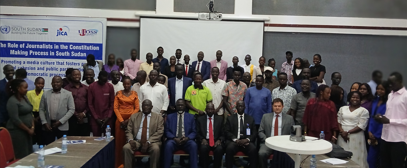More than 100 journalists from across South Sudan have gathered in Juba for a three-day training workshop aimed at strengthening their role in reporting on the country’s permanent constitution-making process.
The workshop, under the theme “Promoting a Media Culture that Fosters Peace, Social Cohesion, and Public Participation in Democratic Processes,” which began on Monday, is organized by the Union of Journalists of South Sudan (UJOSS) in partnership with the Japan International Cooperation Agency (JICA) and the United Nations Mission in South Sudan (UNMISS).
Speaking at the opening ceremony, Justice Minister Dr. Wek Mamer Kuol emphasized the media’s vital role in informing and educating the public.
“The media must help the public understand the constitution-making process and encourage informed participation,” he said.
On his part, UJOSS President Patrick Oyet said the training is part of efforts to enhance journalists’ understanding of their responsibilities in shaping national dialogue.
“Our goal is to empower journalists to report ethically, especially on sensitive constitutional and political matters,” he stated.
Meanwhile, Dr. Riang Yer Zuor, Chairperson of the National Constitutional Review Commission (NCRC), noted that the training supports ongoing efforts to engage the public and strengthen democratic participation.
“We want the media to deliver the right message to the people,” he said. “Citizens must be informed and consulted.”
Zuor added that the 2026 elections hinge on the full implementation of key provisions of the 2018 Revitalized Peace Agreement (R-ARCSS), including the adoption of a permanent constitution, security arrangements, and political space.
Speaking on behalf of UNMISS, Guy Bennett praised the initiative, urging journalists to use their platforms to promote transparency, inclusion, and accountability.
“You are not merely observers, you are facilitators of dialogue and agents of transparency,” Bennett said. “Your reporting ensures citizens across all communities are informed, engaged, and empowered.”
He highlighted the importance of accurate reporting and monitoring the implementation of the Constitution Making Process Act of 2022 to safeguard the credibility of the process.
Some participants expressed concern over the limited timeframe of the training. Emmanuel Napoleon, a journalist from Hope FM in Kajokeji, said the workshop is good, but three days are not enough.
“Extending it to five days would help us better understand the constitution-making process,” he opined.
He also urged organizers to conduct more sessions ahead of the elections to better equip journalists for their roles.
Garang John Juma, a journalist from Warrap State, called for better protection and support for journalists, especially in insecure areas.
“We face many challenges, from insecurity to lack of equipment, and we hope this training gives us the skills to promote peace and engage communities during the voting process,” he said.
The workshop runs through Wednesday and includes sessions on constitutional literacy, conflict-sensitive reporting, and civic engagement.




